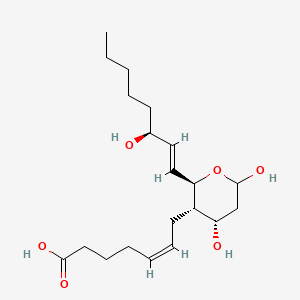Thromboxane b2
Thromboxane b2 is a lipid of Fatty Acyls (FA) class. Thromboxane b2 is associated with abnormalities such as endothelial dysfunction, Diabetes Mellitus, Non-Insulin-Dependent, Diabetes Mellitus, Ischemia and Thrombocytosis. The involved functions are known as Platelet Activation, Excretory function, Anabolism, Inflammation and mRNA Expression. Thromboxane b2 often locates in Endothelium, Hepatic and Microsomes, Liver. The associated genes with Thromboxane b2 are PTGS2 gene, prothrombin fragment 2 and CCL14 wt Allele.
Cross Reference
Introduction
To understand associated biological information of Thromboxane b2, we collected biological information of abnormalities, associated pathways, cellular/molecular locations, biological functions, related genes/proteins, lipids and common seen animal/experimental models with organized paragraphs from literatures.
What diseases are associated with Thromboxane b2?
Thromboxane b2 is suspected in endothelial dysfunction, Diabetes Mellitus, Non-Insulin-Dependent, Diabetes Mellitus, Ischemia, Thrombocytosis, Acute Coronary Syndrome and other diseases in descending order of the highest number of associated sentences.
Related references are mostly published in these journals:
| Disease | Cross reference | Weighted score | Related literature |
|---|
Possible diseases from mapped MeSH terms on references
We collected disease MeSH terms mapped to the references associated with Thromboxane b2
PubChem Associated disorders and diseases
What pathways are associated with Thromboxane b2
There are no associated biomedical information in the current reference collection.
PubChem Biomolecular Interactions and Pathways
Link to PubChem Biomolecular Interactions and PathwaysWhat cellular locations are associated with Thromboxane b2?
Visualization in cellular structure
Associated locations are in red color. Not associated locations are in black.
Related references are published most in these journals:
| Location | Cross reference | Weighted score | Related literatures |
|---|
What functions are associated with Thromboxane b2?
Related references are published most in these journals:
| Function | Cross reference | Weighted score | Related literatures |
|---|
What lipids are associated with Thromboxane b2?
There are no associated biomedical information in the current reference collection.
What genes are associated with Thromboxane b2?
Related references are published most in these journals:
| Gene | Cross reference | Weighted score | Related literatures |
|---|
What common seen animal models are associated with Thromboxane b2?
There are no associated biomedical information in the current reference collection.
NCBI Entrez Crosslinks
All references with Thromboxane b2
Download all related citations| Authors | Title | Published | Journal | PubMed Link |
|---|---|---|---|---|
| Oviedo PJ et al. | Progestogens reduce thromboxane production by cultured human endothelial cells. | 2011 | Climacteric | pmid:20443717 |
| Sambu N et al. | Effect of clopidogrel withdrawal on platelet reactivity and vascular inflammatory biomarkers 1 year after drug-eluting stent implantation: results of the prospective, single-centre CESSATION study. | 2011 | Heart | pmid:21795297 |
| Spectre G et al. | Twice daily dosing of aspirin improves platelet inhibition in whole blood in patients with type 2 diabetes mellitus and micro- or macrovascular complications. | 2011 | Thromb. Haemost. | pmid:21800009 |
| Hoh CM et al. | Evaluation of effects of low-dose aspirin administration on urinary thromboxane metabolites in healthy dogs. | 2011 | Am. J. Vet. Res. | pmid:21801060 |
| Dalli E et al. | Effects of hawthorn (Crataegus laevigata) on platelet aggregation in healthy volunteers. | 2011 | Thromb. Res. | pmid:21737127 |
| Gao F et al. | Effect of polymorphism and type II diabetes on aspirin resistance in patients with unstable coronary artery disease. | 2011 | Chin. Med. J. | pmid:21740787 |
| Lukasik M et al. | Aspirin treatment influences platelet-related inflammatory biomarkers in healthy individuals but not in acute stroke patients. | 2011 | Thromb. Res. | pmid:21788065 |
| Shen L et al. | In vivo oxidation, platelet activation and simultaneous occurrence of natural immunity in atherosclerosis-prone mice. | 2011 | Isr. Med. Assoc. J. | pmid:21845968 |
| Graziani F et al. | Thromboxane production in morbidly obese subjects. | 2011 | Am. J. Cardiol. | pmid:21439532 |
| Cathcart MC et al. | Examination of thromboxane synthase as a prognostic factor and therapeutic target in non-small cell lung cancer. | 2011 | Mol. Cancer | pmid:21388528 |
| Oh SH et al. | Association analysis of thromboxane A synthase 1 gene polymorphisms with aspirin intolerance in asthmatic patients. | 2011 | Pharmacogenomics | pmid:21449675 |
| Akagi Y et al. | Influence of nonsteroidal anti-inflammatory drugs on the antiplatelet effects of aspirin in rats. | 2011 | Biol. Pharm. Bull. | pmid:21415533 |
| Capodanno D et al. | Pharmacodynamic effects of different aspirin dosing regimens in type 2 diabetes mellitus patients with coronary artery disease. | 2011 | Circ Cardiovasc Interv | pmid:21386092 |
| Yan LG et al. | Injectable caltrop fruit saponin protects against ischemia-reperfusion injury in rat brain. | 2011 | Am. J. Chin. Med. | pmid:21476209 |
| Liu JQ et al. | Effects of tanshinone IIA, a major component of Salvia miltiorrhiza, on platelet aggregation in healthy newborn piglets. | 2011 | J Ethnopharmacol | pmid:21453766 |
| Halawani SH et al. | Aspirin failure in patients presenting with acute cerebrovascular ischaemia. | 2011 | Thromb. Haemost. | pmid:21544317 |
| Gonçalves LH et al. | Urinary 11-dehydro thromboxane B₂ levels in type 2 diabetic patients before and during aspirin intake. | 2011 | Clin. Chim. Acta | pmid:21510926 |
| Bauer J et al. | Arzanol, a prenylated heterodimeric phloroglucinyl pyrone, inhibits eicosanoid biosynthesis and exhibits anti-inflammatory efficacy in vivo. | 2011 | Biochem. Pharmacol. | pmid:20933508 |
| Ceprnja M et al. | Oxidative stress markers in patients with post-traumatic stress disorder. | 2011 | Coll Antropol | pmid:22397253 |
| Toliopoulos IK et al. | Inhibition of platelet aggregation and immunomodulation of NK lymphocytes by administration of ascorbic acid. | 2011 | Indian J. Exp. Biol. | pmid:22403863 |
